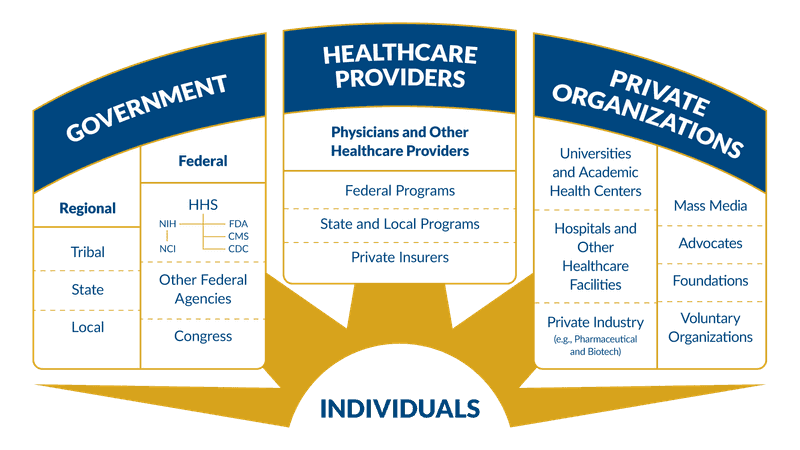What Is the National Cancer Program?
One of the most important tasks of the President’s Cancer Panel is to monitor the National Cancer Program. But what is that program, exactly? And what does it do?
The National Cancer Program represents all those affected by cancer and those who can address the burden of cancer to create a better future. This community includes cancer patients and survivors, people at risk of cancer, researchers, health care providers, advocates, family members, and caregivers of those diagnosed with cancer. It also connects local, state, and federal governments; the pharmaceutical and biotechnology industries; health care systems; academic institutions; and nonprofit organizations. Everyone has a part to play in this important work.
Half a century ago, cancer was on the rise in the United States. To combat this threat, President Nixon signed the National Cancer Act of 1971 into law. This new law created multiple important groups and efforts, including the National Cancer Program.
The law empowered the Director of the National Cancer Institute to guide the National Cancer Program as it became a “coordinated cancer research program encompassing the programs of the National Cancer Institute, related programs of other research institutes, and other Federal and non-Federal programs.” The program was charged with drawing on and supporting research from across the country and around the world in order to accelerate cancer research and speed its translation from the laboratory to the patient.
In its creation of the National Cancer Program, the National Cancer Act of 1971 included an important new mechanism for its oversight: the President’s Cancer Panel. The law dictated that the Panel would be composed of three Presidential appointees, “...who by virtue of their training, experience, and background are exceptionally qualified to appraise the National Cancer Program.” The law calls on the Panel to monitor the Program's development and execution and report to the President on progress, efficacy, and opportunities for improvement.
The President's Cancer Panel has examined a broad range of issues facing the National Cancer Program, from the cost of therapeutics to the burden of cancer experienced by historically marginalized and underserved populations. While the Program emphasizes research, the Panel has called on stakeholders from all corners of the cancer community—including patients, providers, and others in the public and private sector—to come together to reduce the burden of cancer. The Panel’s reports and recommendations—more than 30 reports to 10 Presidents since 1973—have been, and will continue to be, an important part of the National Cancer Program’s progress.
The spotlight on cancer brought about by the National Cancer Act and National Cancer Program has catalyzed some of the most important developments in cancer research and care of the last 50 years. Scientists have identified cancer-related genes, tested groundbreaking new treatments, developed effective risk reduction and screening strategies, and collaborated across disciplines to find ways to better support cancer patients, survivors, and their loved ones.
Today, the Program is as vital and productive as ever. In April 2023, the U.S. Department of Health and Human Services released a National Cancer Plan, which provides a framework for all stakeholders in the National Cancer Program—from researchers and health care providers to cancer patients and survivors—to work together to end cancer as we know it, for all. For more information on the Plan and the Panel’s role in assessing it, see the Panel’s earlier blog post President's Cancer Panel Commends National Cancer Plan.
